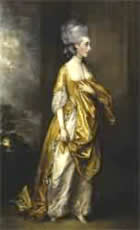
The life of the best-known courtesan in Scottish
history, Grace Dalrymple Elliott is getting
a rerun in the Scottish capital this week, thanks
to a French "new wave" film director
and the French Film Festival. And public notoriety
still appears to be dogging her heels.
The 18th-century prostitute, who seduced the
Prince of Wales, the Duke of Orleans and Napoleon
Bonaparte is at the centre of scandal again
almost 200 years after her death, thanks to
the revered French film director, Eric Rohmer.
Mr Rohmer has immortalised Grace’s life
as a courtesan in revolutionary Paris in his
latest film, after studying her memoir, Journal
of My Life During the French Revolution. His
film - L’Anglaise et le Duc
- literally The Englishwoman and the Duke
- is being screened in Scotland this week.

Edinburgh Beginnings
Born in Edinburgh in 1758, Grace Dalrymple was
the youngest child of a lawyer. Her father deserted
his wife just months before her birth, and the
young Grace was sent to France as a child, to
be educated in a convent.
At the age of 15, she was brought back to her
father’s house to make her debut in Edinburgh
society. Blessed with natural beauty and a gloss
of French sophistication, she instantly became
the "It" girl of her age.
Shortly after returning to Scotland, she met
her future husband Sir John Elliott, a Scottish
physician 20 years her senior. They married
in haste - and Grace repented at her leisure
with a series of extra-marital affairs, before
finally running off with Lord Valentia in 1774.
Dis-Graced
Elliott sued for divorce, receiving a settlement
of UKP12,000, and the disgraced Grace was sent
back to a French convent. But shortly afterwards
she was rescued by Lord Cholmondley, another
of her lovers, who took her to England, where
she became one of the most celebrated courtesans
of her age.
Lord Cholmondley introduced Grace to the then
Prince of Wales - later George IV - who claimed
paternity of her daughter, Georgiana Seymour,
born in 1782. The royal prince introduced her
to the Duke of Orleans - Le Duc of the title
- and she moved to France to be his mistress.
As a royalist, Grace was imprisoned four times
during the revolution, but was finally released
by Robespierre. She returned to England, but
went back to France and died at Ville D’Avray
in 1823.
French Storm
The film has already caused a storm in France,
where Rohmer has come under fire for examining
the revolution through the eyes of Grace’s
royalist perspective. Now both the Saltire Society
and SNP have criticised the film’s title.
Paul Scott, president of the Saltire Society
said: "This is quite typical of the complete
inability of anyone outside Scotland to distinguish
between Scotland and England as culturally diverse
entities.
Offence Taken!
"Dalrymple and Elliott are two good Scottish
names, and this woman was born in Scotland,
but still she is presented in this film title
as an Englishwoman. It is particularly offensive
coming from a Frenchman, considering the Auld
Alliance that Scotland and France enjoyed for
300 years from the 13th century, when England
was our common enemy."
Disassociation?
Mike Russell, the SNP’s spokesman on arts
and culture, said: " Perhaps we should be grateful
this courtesan has been described as English,
considering how she made her living. Maybe Scotland
does not want to be associated with her."
A spokeswoman for the film’s producers
and distributors, Pathé, said: "L’Anglaise
is the word that French people use to describe
a person from the UK, so it is used by the French
for Scottish people too."
Rohmer is regarded as one of the founding fathers
of the Nouvelle Vague - the new wave - which
revolutionised French cinema in 1950s and 1960s.
Six Comtes Moraux (Six Moral Tales) and
Comtes des Quatre Saisons (Tales of Four
Seasons) are seen as classics, with their
observations on everyday life and relationships.
|